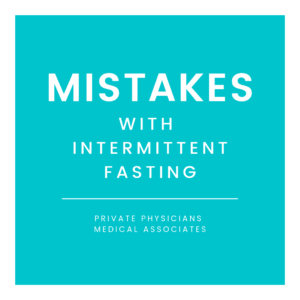Have you heard about Intermittent Fasting? Fasting has been used throughout history for various health benefits such as weight loss, mental clarity, metabolism, glucose and other conditions.
The most common types are:
Daily intermittent fasting: eating within a 4-10-hour window and fasting for 14-20 hours
24-hour fast: fasting for 24 hours, typically 1-2 times a week
5:2 protocol: restricting calories to 20-25% of your usual intake for two nonconsecutive days in a 7-day time frame and consuming calories as per usual for the other 5 days
Regardless of the intermittent fasting form people choose, they tend to make the same five common mistakes:
1) Not eating the suggested foods
You need to be able to control your appetite and the foods you eat. A carbohydrate reliance can make fasting difficult because our blood glucose is constantly fluctuating, and in turn our appetite is constantly fluctuating. An easy way to fast is to follow a low-carbohydrate diet where the focus is on quality proteins and fats. This way you are satiated for longer periods of time and allow for the metabolic flexibility to tap into fat stores for fuel during the fasting window. You may even end up going in and out of ketosis without even trying, just by virtue of the diet and the long periods of time between meals. The satiety factor of a low-carbohydrate diet can work in your favor during the fasting window.
2) Not being prepared
Eating at odd times can be difficult, especially without meal preparation. This could lead to poor food choices or messing up your “eating” and “fasting” windows.
3) Not eating enough calories
Although fasting is typically used to reduce caloric intake, restricting too many could have a negative impact. If you struggle to consume enough calories in your allotted “eating window,” consider extending your window to support your goals and optimize your health.
4) Restricting all day and binging at night
Waiting until the end of the day to consume all, or the majority, of daily calories can work for some people but in others may trigger binge eating. This could lead to consuming more food than you normally would have, had you spread your meals throughout the day. In addition, overeating in the evening, and too close to bedtime, can result in poor sleep and disruption of circadian rhythms. You may wake up not feeling your best by eating in this way, and the whole reason for intermittent fasting is to feel better!
5) Making exceptions for what you consume outside your “eating window”
To make things simple, anything with calories, and therefore energy, “breaks a fast.” This means no butter in your coffee and no glass of wine before bed. We hate to break it to you, but a true fast includes water only.
If you have questions about intermittent fasting, contact our office today to schedule an appointment with Stephanie Lapinski, PPMA’s Certified Nutritionist and Lifestyle Educator @ (949) 566-8179


